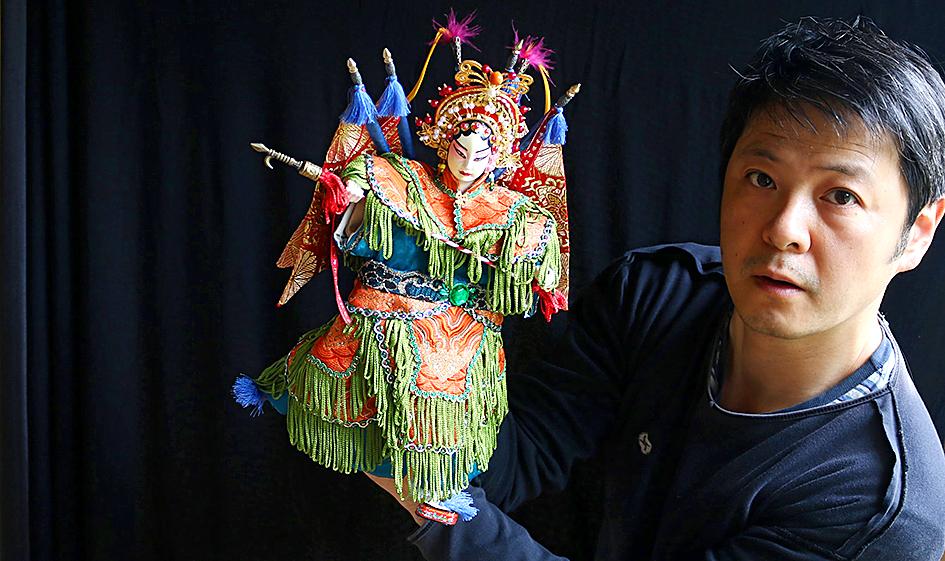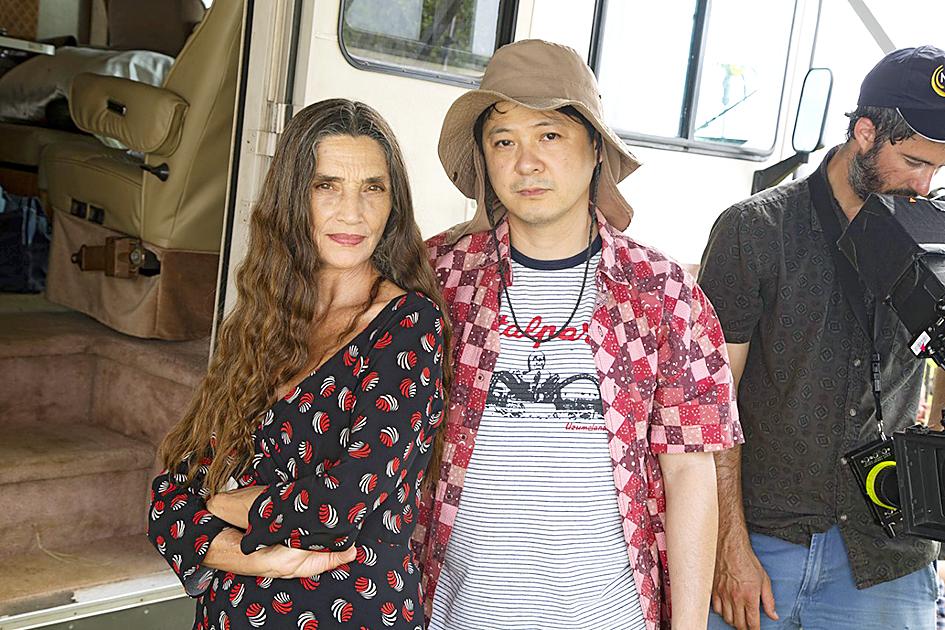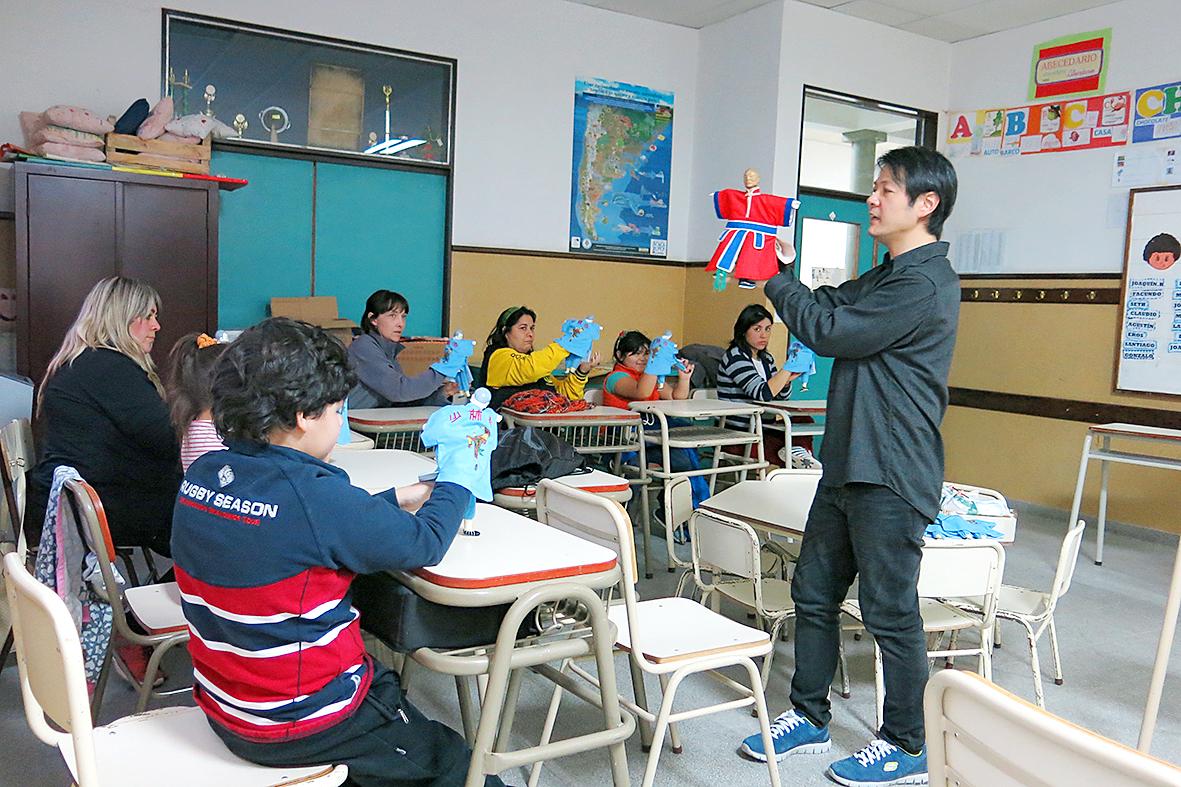Ignacio Huang (黃勝煌) is a puppet master. But unlike Argentina’s political operators, he doesn’t pull strings. “It’s glove puppetry,” says Huang of budaixi (布袋戲, traditional Taiwanese puppetry), which in recent years has replaced the big screen as his bread and butter.
Ahead of legislative elections in Argentina tomorrow, the two types of manipulation — physical and figurative — intersected last week, as Huang performed on Friday at a comedor — a lunch-providing school for disadvantaged children — paid for by the ruling Frente de Todos (Front for All) coalition, which controls the Buenos Aires Province legislature, and then on Sunday at a festival at Rosedal de Palermo park funded by the opposition Juntos Por El Cambio (Together For Change), which holds the balance of power in the city government.
Were the performances organized with the vote in mind?

Photo courtesy of Ignacio Huang
“Oh sure,” says Huang, who shot to fame in Latin America with a starring role in the 2011 comedy hit Un Cuento Chino (Chinese Take-away). “When there’s no election, nothing is given! It’s clientelism. This is the third world!”
Sandwiched between was another puppet-based event at a Chinese school organized by Taiwan’s Overseas Community Affairs Council (OCAC, 僑務委員會). This burst of activity followed 234 consecutive days of lockdown in Buenos Aires — the longest continuous confinement of any city.
“A month ago, they said ‘Now you can go out. The pandemic’s almost over,’” Huang says. “‘Everybody go out and work because the economy is dying!’”

Photo courtesy of Ignacio Huang
Having transitioned to remote work, Huang considers himself lucky. Bolstered by OCAC courses he took in Taiwan in 2018, Huang’s background in graphic design made online classes in Chinese arts and culture a good fit.
“I’ve always painted, so ink painting was natural for me,” he says. “I’m also teaching Chinese cooking.”
I express surprise. When we met in 2014, he was struggling with Taiwanese staples.

Photo courtesy of Ignacio Huang
“Ha, yes, you’re right, but I can cook well now,” he says. “I’m not a professional, but I’m an actor. I know how to bring joy to the classes, so the students love it.”
Still, he has missed the real thing. Noting that Argentinians are master rule-benders, he admits to sneaking in some street theater with a friend during lockdown.
“I took a train to a station where I knew there were no police and walked for about 40 blocks,” he says. “We threw a hat on the street and people put quite a lot of money in.”
TRIUMPHANT RETURN
On the cusp of COVID, things looked much rosier. In November 2019, Huang was shooting Charlotte, a comedy with legendary Spanish actress Angela Molina in Asuncion, Paraguay, where he lived for eight years after emigrating from Taiwan in the 1990s.
It was his first return in almost 30 years.
“I was excited to be back, and with a good reason: I went back famous!” he says. “When I left, I was nobody, and now here I am back in Paraguay, shooting a movie with a monster of cinema — Angela Molina!”
He caught up with teachers and classmates, including two close friends who have become well-known artists.
“They were all so proud of me,” he says. His old school was barely recognizable. “There was nothing left,” he says. Elsewhere, things were superficially different, but some scratching peeled off the veneer.
“When I left, there was no shopping,” he says. “Now there are lots of luxury shops but no one in them. And they don’t want anyone buying because they’re for money laundering!”
When shooting wrapped, Huang visited the Taiwanese embassy to get support for a puppet tour of Paraguay, including shows at the Biennial of Asuncion the following spring. Simon Franco, the director of Charlotte had previously contacted the embassy looking for “Chinese” extras, and Huang saw an opening.
“I wrote and said, ‘I’m a co-star of the movie and I’m Taiwanese,’” he says. “When they saw my brochures, they were very happy to help because I’m the only one doing Chinese puppets in Spanish in South America.”
CROSSING LINES
The embassy agreed to cover flights and hotels for Huang and fellow performers. In Ciudad del Este, which is renowned for its Taiwanese presence, and Encarnacion, Paraguay’s third city, Huang secured backing from community leaders for further shows. Then came COVID. Still, Huang is hopeful the shows can be rejigged for next summer’s biennial.
Charlotte finally premiered in Asuncion on Sept. 23 — the day theaters re-opened in the city. Travel restrictions prevented the main stars from attending.
Huang was the only actor at the January premier in Buenos Aires, where the film ran for a week at 50 percent capacity, before showing free online for another week. It was relatively well received by Argentina’s notoriously “cruel” critics, he says. It’s a curious film. Echoing Franco, Huang calls it a “soft comedy” that wasn’t selected for major film festivals because it “maybe wasn’t weird enough and didn’t have an important message.”
This assessment seems only partly right. There’s plenty of weirdness, but it’s often hard to see any justification for it. Huang agrees, referring to a cinematic trend toward nueva escritura (new writing). Noting that Franco’s two cowriters were “very young,” Huang compares the style to social media.
“They have all these lines crossing without any explanation — it’s something like Instagram,” he says. “All I can do is convince myself of why my character is doing something.”
EXOTIC OTHER
The appearance of a group of Taiwanese tourists flying a drone, which Huang’s character Lee purchases, is a baffling subplot.
“Franco didn’t know I was Taiwanese when he cast me,” says Huang. “But when he learned about Paraguay’s political connection with Taiwan, he gave that more visibility,” he adds, noting the prominence of the Republic of China flag in several scenes.
“But he treated the Taiwanese as something weird.”
This exoticizing of difference irks.
“Because we are ‘other,’ we have to reflect that they are normal, that they are beautiful, that they are correct; so we have to be incorrect, we have to be abnormal, we have to be weird,” he says “Why does my character have to eat cup noodles in every film? Can’t they come up with anything better?”
Yet, Huang believes Argentina has provided opportunities that were not available in Taiwan. Having attempted to make his mark during a year-long sojourn in 2017, he became disillusioned with the industry in his country of birth.
“Taiwanese just don’t need me, but in Argentina, I think I have a place,” he says.
With the ruling Peronist coalition poised to lose control of Argentine Senate for the first time in almost 50 years, Huang anticipates “deep change.” Despite, the uncertainty, he is upbeat. A puppet tour of Argentina’s coastal resorts is booked for February, and Huang is seeking funding for a Beijing Opera-influenced theater production that he is writing. These projects allow him to “escape the cage” and “give myself the characters I would like to do.”
As ever, his optimism is tempered by cynicism. Referring to a lawsuit against a group of former proteges who stole the puppets, sets and plays he had created, Huang puts the miscreants in the same bracket as the politicians.
“That’s Argentinians,” he says. “They are quite capable of the most shameless things.”

April 14 to April 20 In March 1947, Sising Katadrepan urged the government to drop the “high mountain people” (高山族) designation for Indigenous Taiwanese and refer to them as “Taiwan people” (台灣族). He considered the term derogatory, arguing that it made them sound like animals. The Taiwan Provincial Government agreed to stop using the term, stating that Indigenous Taiwanese suffered all sorts of discrimination and oppression under the Japanese and were forced to live in the mountains as outsiders to society. Now, under the new regime, they would be seen as equals, thus they should be henceforth

Last week, the the National Immigration Agency (NIA) told the legislature that more than 10,000 naturalized Taiwanese citizens from the People’s Republic of China (PRC) risked having their citizenship revoked if they failed to provide proof that they had renounced their Chinese household registration within the next three months. Renunciation is required under the Act Governing Relations Between the People of the Taiwan Area and the Mainland Area (臺灣地區與大陸地區人民關係條例), as amended in 2004, though it was only a legal requirement after 2000. Prior to that, it had been only an administrative requirement since the Nationality Act (國籍法) was established in

With over 80 works on display, this is Louise Bourgeois’ first solo show in Taiwan. Visitors are invited to traverse her world of love and hate, vengeance and acceptance, trauma and reconciliation. Dominating the entrance, the nine-foot-tall Crouching Spider (2003) greets visitors. The creature looms behind the glass facade, symbolic protector and gatekeeper to the intimate journey ahead. Bourgeois, best known for her giant spider sculptures, is one of the most influential artist of the twentieth century. Blending vulnerability and defiance through themes of sexuality, trauma and identity, her work reshaped the landscape of contemporary art with fearless honesty. “People are influenced by

The remains of this Japanese-era trail designed to protect the camphor industry make for a scenic day-hike, a fascinating overnight hike or a challenging multi-day adventure Maolin District (茂林) in Kaohsiung is well known for beautiful roadside scenery, waterfalls, the annual butterfly migration and indigenous culture. A lesser known but worthwhile destination here lies along the very top of the valley: the Liugui Security Path (六龜警備道). This relic of the Japanese era once isolated the Maolin valley from the outside world but now serves to draw tourists in. The path originally ran for about 50km, but not all of this trail is still easily walkable. The nicest section for a simple day hike is the heavily trafficked southern section above Maolin and Wanshan (萬山) villages. Remains of